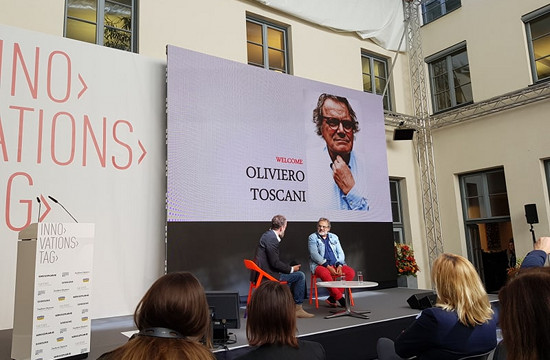
Oliviero Toscani Takes Issue with Advertising Agencies

This week, Oliviero Toscani sounded eerily like Bill Hicks as he addressed a room in Munich full of marketers. “Who is in marketing here?” His question provoked a forest of raised hands. He stopped short of inviting suicide though. His version: “be ashamed.”
The 76-year-old photographer, well known for his collaborations with the Benetton fashion brand, creating their ad campaigns in the ‘80s and ‘90s, was speaking at Innnovationstag 2018 (Innovation Day) in Munich - an event organised by the creative agency Serviceplan at its headquarters there. He was on stage with Serviceplan’s chief creative officer Alexander Schill, who valiantly persevered with the interview, laughing it off.
After returning to the fashion brand last year following a 17-year hiatus, Oliviero's recent campaigns have provoked discussion true to his form. After putting a Benetton logo on a picture of migrants in life jackets being rescued from the sea by volunteers, the campaign was condemned by the rescue charity in the photo, SOS Méditerranée, as well as the Italian interior minister Matteo Salvini and many of the public.
He defended that work and his motivations for the decision, diagnosing what he sees as a great problem with today’s world: “A Rolex watch is welcome wherever, but [I] as a human being [am] not… The future merchandise of humanity is humanity itself.” Later in the discussion he added, in defence against the ‘provocative’ label he is so often lumbered with: “Provocation is not a bad word. I can provoke peace and love.”
Speaking in an age where so many brands seem to be searching for social issues to align themselves with or ‘join the discussion’ on, Alex suggested that Oliviero’s early work with Benetton - associating it with subjects such as AIDS, religion and racism - was ahead of his time in this respect.
The photographer’s response was that advertising should not be seperate from the rest of the world and its ethics. He stressed that people are “not Dr. Jekyll and Mr. Hyde” but noted that he had never worked in an ad agency and suggested that such companies are less well equipped to create work that truly moves people because they create ideas via a committee. In the end the idea is inevitably a mediocre compromise, he said: “nobody will like it; nobody will hate it.”
His criticism of the industry continued onto a more personal track later: “Anybody who says ‘I am a creative person’ is an idiot,” he declared, not phased by the fact that his interviewer’s job description has contained the ‘c’ word for over 20 years. “But you still call yourself ‘art director’, you call yourself ‘creative director’. Sorry. Not even God directed creation. He did everything by himself, alone. I think this is nonsense.” Alexander took this with great dignity and good humour, which is fortunate because it was a theme Oliviero returned to throughout the discussion. “I would never call myself ‘creative director’,” he said. “I would be embarrassed. You should change your title.”
Another comment from the photographer (who has often been described as Benetton’s art director) later in the discussion: “Art director? If you can direct that art, that art is lousy, mediocre.”
“Creativity cannot be secure,” he mused. “Your highest moment of insecurity is probably your highest moment of creativity. Marketing people, advertising people, they want to be secure. So they cannot produce creativity.”
Although respectful throughout, Alexander wasn’t entirely passive. “Did you ever receive a brief for a Benetton campaign?” he ventured. The Italian’s response was clear: “I don’t work with Benetton. I work with Luciano Benetton. There is nothing between.”
After a sustained barrage of accusations against ad agencies, Alexander offered a defence of the work that Serviceplan and companies like it do. “Art and advertising are mirroring society. In advertising we try and do it good,” he said. “We try to grab what’s going on out there and take it to another stage.”
His interviewee seemed to believe this. “Yes, you do, but you don’t do it. The most interest you have got is [in] your budget. And for that you gave up your morality as an artist.”
The Q&A session was lively too. One audience member wondered how the photographer feels about the work of vocally commercial artists from Andy Warhol to Ridley Scott, provoking something of a backtrack from Oliviero. “I’m not against advertising,” he said. “What is not advertising? The Sistine Chapel is advertising! I’m against what is generally what you understand when you say ‘advertising’ - that segment of communication that is totally mediocre, hypocritical and not intelligent enough to be [part of] the society they are interfering [in].”
Make of it what you will, but it wasn’t a boring hour’s discussion. And if nothing else, Oliviero Toscani upheld his reputation for being ‘provocative’.













